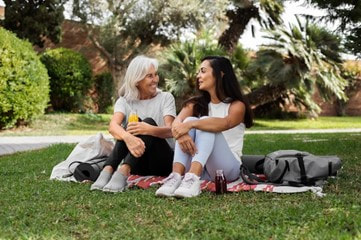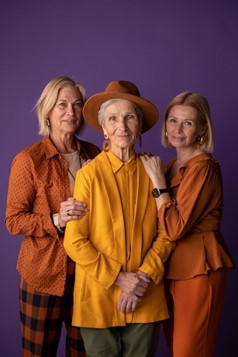|
A new survey on adult friendships found that having friends of a different generation brings unique benefits. 90% of adults believe friendships are essential to a happy and healthy life. Even though close friends are often similar in age, nearly four in ten adults have a close friend who is at least 15 years older or younger than them (Levy & Thayer, 2019). People with a close intergenerational friend agree that having friends in a distinct age group has benefits different from the benefits of friendships among people of the same age. Intergenerational friends offer company, fun, and enjoyment in unexpected ways, providing new and varied experiences. Older or younger friends provide access to diverse forms of support, such as practical advice, perspective-taking, role model, insights, or physical care (Korkiamäki, O’Dare, 2021; Levy & Thayer, 2019). Generally, people with intergenerational friendships are likelier to have a positive attitude about ageing (Levy & Thayer, 2019). Having intergenerational friendships has several benefits. Friendships which we can establish, for example, in intergenerational activities carried out in the communities, as those that will be developed under the PAGES project, stay informed of our activities by following our pages. Read more about it here: https://www.cogitatiopress.com/socialinclusion/article/view/4555/4555 https://www.aarp.org/content/dam/aarp/research/surveys_statistics/life-leisure/2019/friendship-across-the-ages.doi.10.26419-2Fres.00314.002.pdf References: Korkiamäki, R., & O’Dare C. (2021). Intergenerational friendship as a conduit for social inclusion? Insights from the “Book‐ends. Cogitatio, 9(4), 304-314. https://doi.org/10.17645/si.v9i4.4555 Levy, V., and Thayer, C. (2019). The Positive Impact of Intergenerational Friendships - Friendship: attitudes and behaviours across the ages. AARP Research. https://doi.org/10.26419/res.00314.002 Image source: https://www.freepik.com/
0 Comments
Ageism is bad enough; however, it's often compounded by sexism. Research on the combined impact of ageism (regarding older age) and sexism has concluded that older women bear the brunt of multiple forms of discrimination (The Economic Times 2023; WHO, 2021). Women are often in a situation of double risk in which patriarchal norms and a preoccupation with youth result in a prompter deterioration of older women's status. This double risk might also explain why older women are judged differently than older men regarding their physical appearance. Culturally women are pressured to do everything at their disposal to delay their ageing process or at least to "age well", but men with grey hair and wrinkles are seen as wise and experienced (WHO, 2021). This is also true in other fields, such as employment, the disadvantages of being too young or too old impact women more than men. Witch suggests that (for these age ranges), being a woman intensifies age prejudice. In this sense, it is crucial to become aware and challenge our stereotypes and realise they can be exacerbated when combining different features (WHO, 2021). You can read more about this topic here. And reflect on these stereotypes by reading this article. References World Health Organization (2021). Global report on ageism. https://www.who.int/teams/social-determinants-of-health/demographic-change-and-healthy-ageing/combatting-ageism/global-report-on-ageism The Economic Times (2023). Women past 50 have to battle ageism & sexism: Study. https://economictimes.indiatimes.com/magazines/panache/women-past-50-have-to-battle-ageism-sexism-study/articleshow/98307624.cms Image source: https://www.freepik.com/ |
AuthorPages ArchivesCategories |


 RSS Feed
RSS Feed
